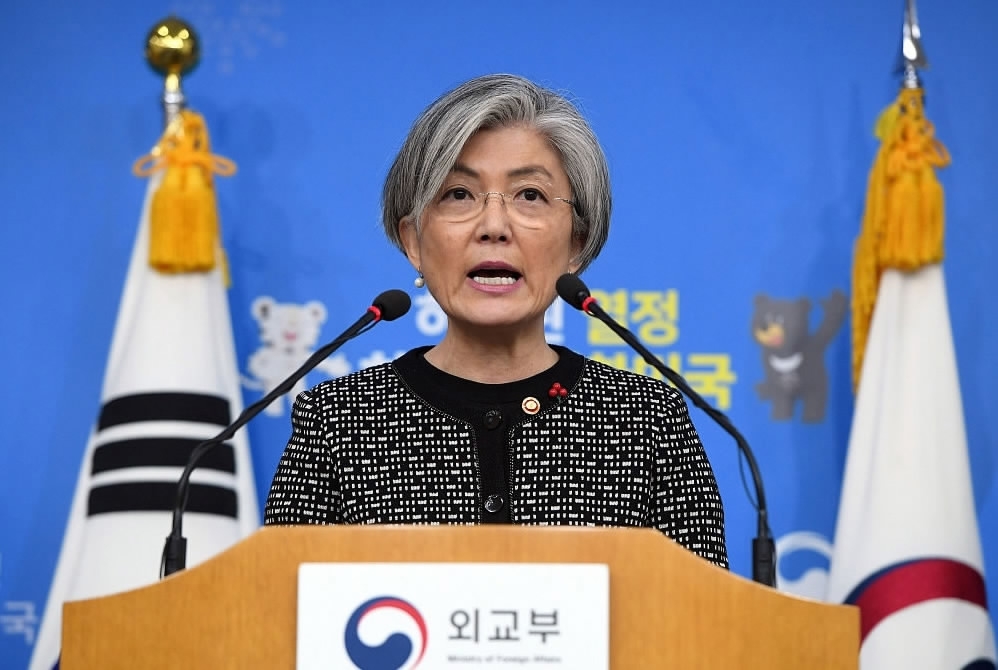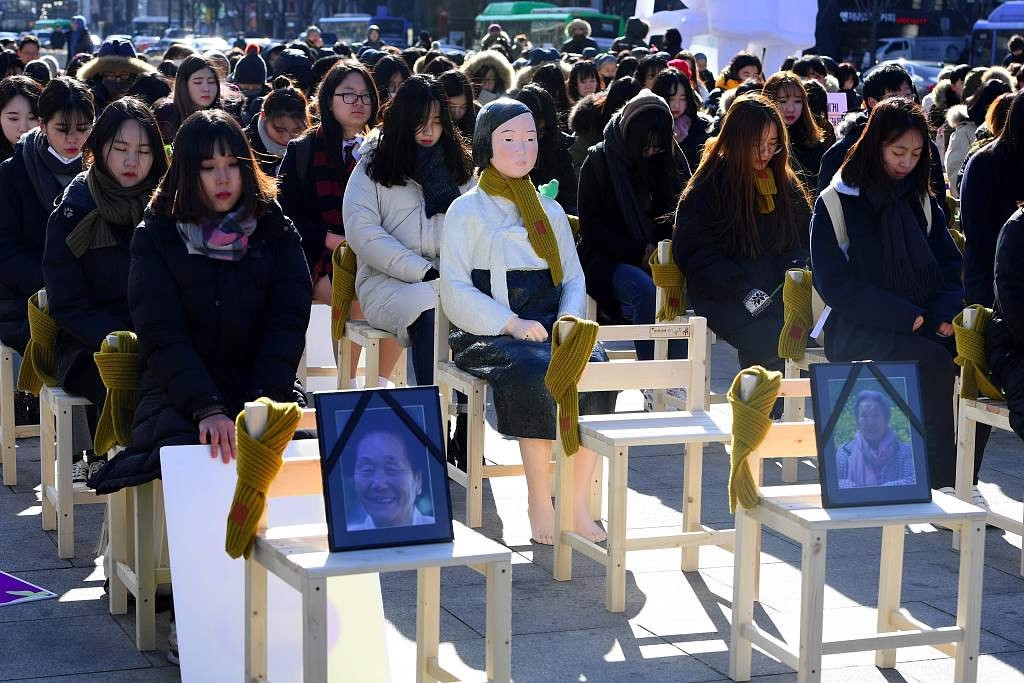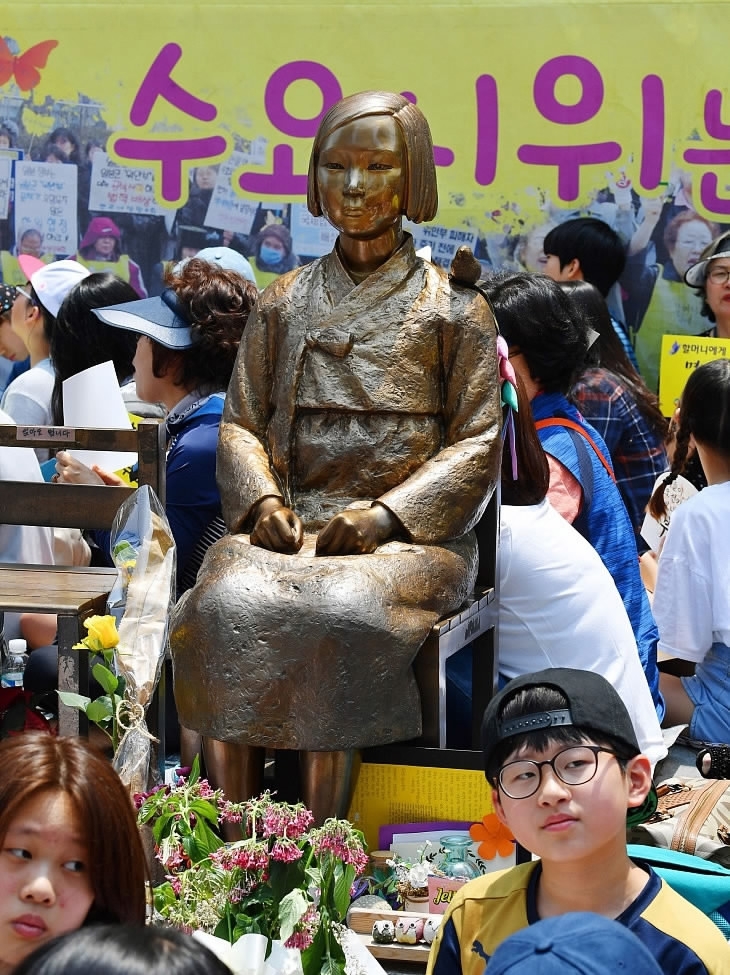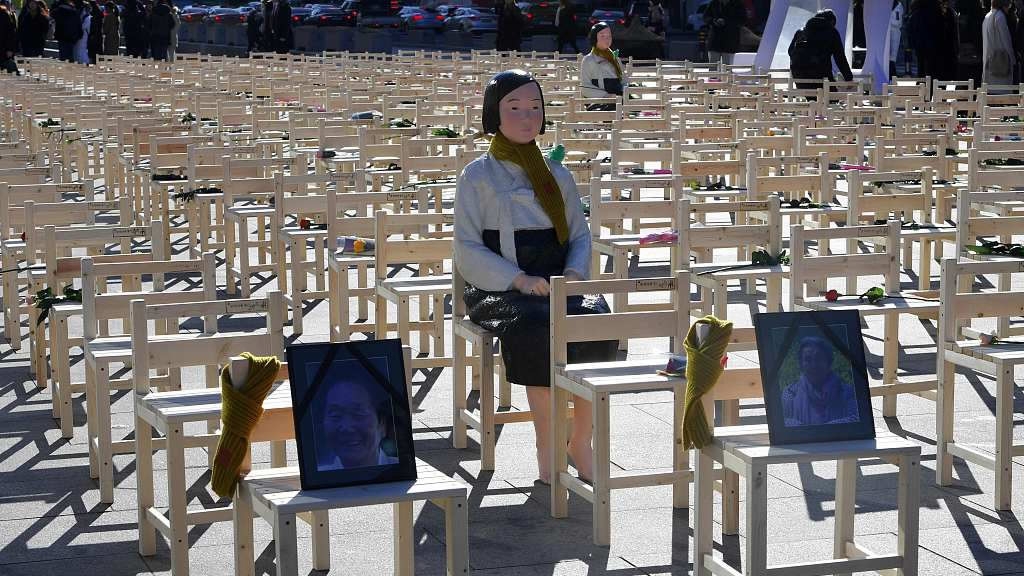In a Korean restaurant I often visit, there’s an ancient TV that always broadcasts the evening news. This year, there was virtually nonstop coverage of North Korea’s missile launches, which usually provoked angry grumbles among the old men across from me.
Yesterday was different.
Yesterday, the central image was a statue – one familiar to any Seoul-based expat. It shows a girl sitting in a chair, outfitted in traditional Korean clothing. She stares forward expressionlessly. This work can be seen all over Seoul, whether it’s in front of the Japanese Embassy, the Itaewon arch, or even installed on a public bus. It represents up to 200,000 girls and women who were sexually enslaved by the Japanese Imperial Army. Today, the media calls them “The Comfort Women,” although NGOs usually discourage the use of this moniker.

South Korean Foreign Minister Kang Kyung-wha speaks before a briefing of a special task force for investigating the 2015 South Korea-Japan agreement over South Korea's "comfort women" issue at the Foreign Ministry in Seoul, South Korea, December 27, 2017. /VCG Photo
South Korean Foreign Minister Kang Kyung-wha speaks before a briefing of a special task force for investigating the 2015 South Korea-Japan agreement over South Korea's "comfort women" issue at the Foreign Ministry in Seoul, South Korea, December 27, 2017. /VCG Photo
Underneath the statue, a scrolling headline declared that President Moon Jae-in had called the previous Comfort Women reparations agreement “seriously flawed.” It was possible he would scrap the deal all together.
“Good for him,” I thought, mixing my bibimbap together.
In 2015, policymakers from Seoul and Tokyo had declared the Comfort Women issue “finally and irrevocably” solved. This, of course, happened during the administration of Park Geun-hye, who was
later ousted from her presidency over corruption charges. The agreement immediately faced a backlash from survivors. The majority of victims had not approved of the deal, and a democratic consensus among them was never reached. Diplomats shook hands in front of flags, but actual victims weren’t satisfied. Park’s successor, Moon Jae-in,
commented on this when he said the 2015 deal constitutes: “a political agreement that excludes victims and the public.”
And when
75 percent of the South Korean public agree that the issue has not been adequately addressed, Japan has a real problem on their hands. The “Comfort Women” legacy undermines Tokyo’s diplomatic credibility and soft power even in 2017. This is especially true if Japan did, as the Seoul-sponsored investigation
asserts, demand that Korea stop using the phrase "sexual slavery" when referring to the issue.

People sit around a statue of a "comfort woman" (C) during an installation of empty chairs during a performance event, commemorating the death of eight former sex slaves this year, in Seoul, December 27, 2017. /VCG Photo
People sit around a statue of a "comfort woman" (C) during an installation of empty chairs during a performance event, commemorating the death of eight former sex slaves this year, in Seoul, December 27, 2017. /VCG Photo
Such an Orwellian rewording is a denial of reality. It’s an implication that, even in 2017, the Japanese government still regards their wartime use of sex slaves as an unfortunate PR issue, rather than a human rights matter.
Japan’s government needs to reconcile with the past in the same way its citizens have – with patience, humility, and a willingness to build peace.
Yet Foreign Minister Taro Kono
said: “[revisions] would make Japan’s ties with South Korea unmanageable and it would be unacceptable.” Here, he encapsulates what is wrong with Japan’s current approach. Abusers don’t get to dictate the terms of forgiveness.

South Koreans gather around a bronze statue of a young girl symbolizing Korean "comfort women" forced to work in wartime Japanese military brothels, near the Japanese embassy in Seoul, South Korea, June 21, 2017. /VCG Photo
South Koreans gather around a bronze statue of a young girl symbolizing Korean "comfort women" forced to work in wartime Japanese military brothels, near the Japanese embassy in Seoul, South Korea, June 21, 2017. /VCG Photo
By prioritizing national narratives over the trauma of enslaved women, he has missed the end goal of diplomacy. A good diplomat empathizes. She or he understands that, given the gravity of a war atrocity, the reconciliation process is sloppy. It can be full of setbacks. Changing administrations can undo previous work, such as the Trump administration’s disastrous withdrawal from the Paris Climate Accords. Japan needs to respect South Korea’s national healing process, even if it takes steps back from time to time. Abusers cannot demand forgiveness.
Nor should victims’ trauma be exploited to advance nationalist agendas. Perhaps Ilaria Maria Sala summarized it best in The New York Times: “The few remaining survivors are being cast in a heavily symbolic role they never asked to play — yet another blow to their long-running quest for recognition and the restoration of their dignity.”
These women are not some metaphor for the Korean colonial experience. They are not rhetorical tools, or money-seekers Tokyo can simply pay off. They are old women seeking justice. At the negotiating table, no agreement can be taken seriously until a consensus among them is reached.
Rolex-wearing graduates of Tokyo University and Seoul National University cannot declare the issue “finally and irreversibly” fixed. Only the 35 remaining survivors can do that. In this regard, even public opinion is obsolete; restaurant patrons scowling at an ancient TV have no sway here. Only victims can dictate the conditions of reconciliation.
Until then, it’s just more men posing for photos in front of flags, insisting that they know what is best for women.
(The author has worked with Democratic People's Republic of Korea refugees for seven years. Today, she lives in Seoul, where she writes about traditional Korean arts, geek culture, human rights, and foreign policy. The article reflects the author’s opinion, and not necessarily the views of CGTN.)





